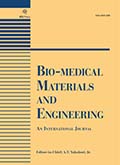Authors: Benameur, Laila | Charif, Naceur | Li, Yueying | Stoltz, Jean-François | de Isla, Natalia
Article Type:
Research Article
Abstract:
Under physiological conditions, there is a production of limited range of free radicals. However, when the cellular antioxidant defence systems, overwhelm and fail to reverse back the free radicals to their normal basal levels, there is a creation of a condition of redox disequilibrium termed “oxidative stress”, which is implicated in a very wide spectrum of genetic, metabolic, and cellular responses. The excess of free radicals can, cause unfavourable molecular alterations to biomolecules through oxidation of lipids, proteins, RNA and DNA, that can in turn lead to mutagenesis, carcinogenesis, and aging. Mesenchymal stem cells (MSCs) have been proven to be
…a promising source of cells for regenerative medicine, and to be useful in the treatment of pathologies in which tissue damage is linked to oxidative stress. Moreover, MSCs appeared to efficiently manage oxidative stress and to be more resistant to oxidative insult than normal somatic cells, making them an interesting and testable model for the role of oxidative stress in the aging process. In addition, aging is accompanied by a progressive decline in stem cell function, resulting in less effective tissue homeostasis and repair. Also, there is an obvious link between intracellular reactive oxygen species levels and cellular senescence. To date, few studies have investigated the promotion of aging by oxidative stress on human MSCs, and the mechanism by which oxidative stress induce stem cell aging is poorly understood. In this context, the aim of this review is to gain insight the current knowledge about the molecular mechanisms of aging-induced oxidative stress in human MSCs.
Show more
Keywords: Aging, oxidative stress, human mesenchymal stem cells
DOI: 10.3233/BME-141247
Citation: Bio-Medical Materials and Engineering,
vol. 25, no. s1, pp. 41-46, 2015
Price: EUR 27.50





